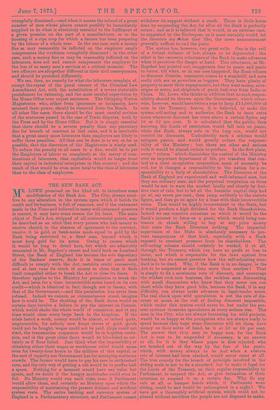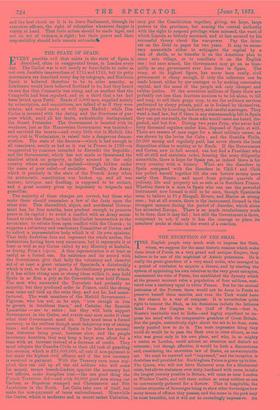THE NEW BANK ACT.
Allt. LOWE promised on the 22nd ult. to introduce some modification of the Bank Act. The City, always sensi- tive to any alteration in the system upon which it builds its credit and its business, is full of rumours, and if the statement made in the Times and believed in many well-informed quarters is correct, it may have some reason for its fears. The main object of Peel's Act, stripped of all controversial points, may be described as an edict that every person who had money to receive should, in the absence of agreement to the contrary, receive it in gold, or bank-notes made equal to gold by the Bank being restricted to , a fixed sum, beyond which it must keep gold for its notes. Owing to causes which it would be long to detail here, but which are admirably recounted in Mr. Bagehot's recent and lucid book on Lombard Street, the Bank of England has become the sole depositary of the Bankers' reserve, finds it in times of panic most difficult to comply with the Act, restricts credit excessively, and at last runs its stock of money so close that it finds itself compelled either to break the Act or close its doors. It therefore applies to the Ministry for permission to break the Act, and issue for a time inconvertible notes based on its own credit—which is identical in fact, though not in theory, with that of the Government,—and this permission has never been refused. Indeed we cannot, as circumstances stand, imagine how it could be. The shutting of the Bank doors would on certain days involve a failure to pay the interest on Consols, which would shake the whole world of commerce, and at any time would close every large bank in the kingdom. If the crisis lasted a week, money would be almost, or indeed quite, unprocurable, for nobody now keeps stores of gold, goods could not be bought, wages could not be paid, ships could not start, the transmarine commerce would be in hopeless confu- sion, and in the great cities there would be bloodshed as cer- tainly as if flour failed. Just think what the impossibility of obtaining either their wages or workhouse relief would mean even for twenty-four hours to the millions of this capital, or the sort of capacity our Government has for managing mutinous crowds. The farmer would have to pay his men in unthrashed corn, and the only way of getting a cab would be to proffer half a spoon. Nothing for a moment would have any value but specie, and we doubt if the hungry multitudes could even be fed. No Ministry would run such risks, even if Parliament would allow them, and certainly no Ministry upon which the responsibility of maintaining the present delicate and artificial system rests. The entire banking and currency system of England is a Parliamentary structure, and Parliament cannot
withdraw its support without a crash. There is little harm done by suspending the Act, for after all the Bank is perfectly secure; and as it is believed that it would, in an extreme case, be supported by the Exchequer, as it most certainly would, let the theorists say &hat they like, the mere announcement generally suffices to end the panic.
The system has, however, two great evils. One is the evil of a formal defiance of law, always to be deprecated ; the other is the excessive reluctance of the Bank to make advances when it perceives the danger at hand. This reluctance, as Mr. Bagehot has pointed out, exaggerates fear to panic and panic to terror, till when, as in one case happened, the Bank refuses to discount Consols, commerce comes to a standstill, and men really rich are as powerless as beggars. They have plenty of property to meet their engagements, but they want money, sove- reigns or notes, not shiploads of goods half-way from India or China. Mr. Lowe, who thinks in addition that no such respon- sibility should be thrown upon the Government, which other- wise, however, would have twice a year to keep £14,000,000 of coin in the Treasury, desires, it is believed, to make the system self-acting and to authorise the Bank to issue extra notes whenever discount has risen above a certain figure, say 10 or 12 per cent. It is calculated that the public, then knowing the limits of restriction, would fall into no panic, while the Bank, always safe in the long run, would not restrict its discounts. Undoubtedly such a scheme would mitigate panics, and would greatly reduce the responsi- bility of the Ministry ; but there are other and serious evils it would be almost certain to produce. In the first place, every " reform " which diminishes the control of the Ministry over an important department of life, yet transfers that con- trol to a close co-optative corporation, must of necessity be evil, for it changes a responsibility to the nation for a re- sponsibility to a body of shareholders. The Directors of the Bank of England are experienced and well-informed men, but they are ordinary men, and the perpetual temptation on them would be not to warn the market loudly and clearly by deci- sive rises of rate, but to let all the loanable capital they had go at, say seven per cent., then jump suddenly to the statute figure, and then go on again for a time with their inconvertible notes. That would be highly inconvenient to the State, but it would produce a high dividend for the Bank Shareholders. Indeed we can conceive occasions on which it would be the Bank's interest to force on a panic, which would bring cus- tomers in shoals willing to buy at any price money that costs the Bank Directors nothing. The impartial supervision of the State is absolutely necessary to pre- vent temptations of that kind, especially with a Bank exposed to constant pressure from its shareholders. The self-acting scheme should certainly be worked, if at all, through the Treasury, which can have no profit or loss to incur, and which is responsible for the laws against free banking, but we cannot perceive how the self-adjusting stan- dard is to be fixed. Why, if the Bank is in no danger, is the Act to be suspended at one time more than another That is simply to fix a maximum rate of discount, and encourage the wildest rush into business, the reckless men discounting with small discounters who know that they never can run short while they have good bills, because the Bank, if in any difficulty, can always make advances in legal-tender notes. The real check upon wild speculation is not the rate of dis- count so much as the risk of finding discount impossible, which under this system could never be, but under the pre- sent systems threatens speculators at every serious rise. The men in the City, who are always borrowing for wild projects, would be as happy as the youngsters who are always ready to spend because they hope some discounter will let them have money on their notes of hand, be it at 50 or 60 per cent. The answer that they may be happy now, for the Bank Act is sure to be suspended if necessary, is no answer at all, for it is they whose paper is first rejected, who are brushed out of the way by the fear of the panic, which, with money always to be had when a statute
rate of interest had been reached, would never come at all. The true remedy for the breach of principle involved in the
sliding scale is not to fix a standard, but to make it legal for
the Lords of the Treasury, on their regular responsibility to Parliament, to suspend the Act, or give intimation of their intention to suspend it on a certain day. Why fix any rule at all, or hamper hands which, if Parliament were sitting, could be and would be unhampered in a night ? We
have got a thoroughly artificial system, which could not be altered without sacrifices the people are not disposed to make,
and the best check on it is to leave Parliament, through its executive officers, the right of relaxation whenever danger is visibly at hand. That their action should be made legal, and not an act of violence, is right ; but their power and their responsibility should both remain untouche%



































 Previous page
Previous page